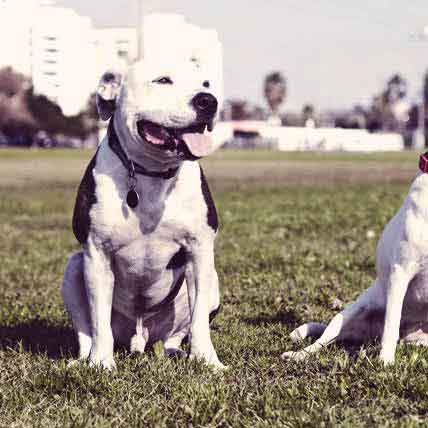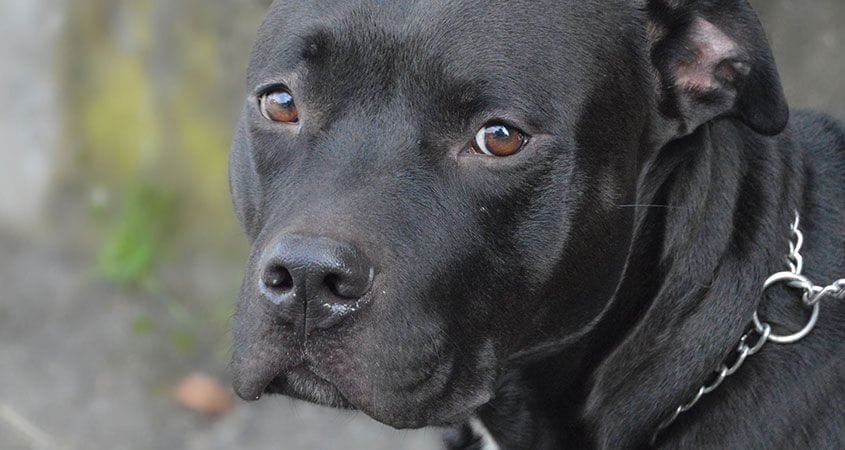Did you know that pitbulls were once known as the “nanny dogs” due to their gentle nature and love for children? Despite their controversial reputation in recent years, pitbulls can be raised to be incredibly kind and loving companions.
Pitbulls, like any other breed, can be raised to be nice through proper training, socialization, and responsible ownership. By providing a loving and supportive environment, consistent discipline, and positive reinforcement, pitbulls can thrive and develop into friendly and well-behaved dogs. In fact, studies have shown that the temperament of a pitbull is largely influenced by its upbringing and environment, rather than being solely determined by its breed. With dedication and commitment, raising a pitbull to be nice is not only possible but highly rewarding.
Raising a Pitbull to be nice requires patience, consistency, and proper training. To ensure a well-behaved Pitbull, follow these steps:
- Start socialization early by exposing your Pitbull to various people and animals.
- Teach basic commands like sit, stay, and come.
- Use positive reinforcement, rewarding good behavior with treats and praise.
- Establish rules and boundaries to set expectations.
- Provide mental and physical stimulation through play and exercise.

Can You Raise a Pitbull to Be Nice?
Welcome to our comprehensive guide on raising pitbulls to be friendly and well-behaved companions. In this article, we will explore whether it is possible to raise a pitbull to be nice, debunking stereotypes and shedding light on the importance of responsible ownership. If you’re considering getting a pitbull or already have one, this article will provide you with valuable insights and tips to ensure your pitbull grows up to be a friendly and loving member of your family.
The Nature of Pitbulls: Debunking Stereotypes
There is a common misconception that pitbulls are inherently aggressive or dangerous dogs. However, this is far from the truth. Like any other breed, a pitbull’s behavior and temperament are influenced by various factors, including genetics, socialization, training, and the environment they are raised in. Pitbulls are not born aggressive; their behavior is shaped by their experiences and the way they are trained and cared for.
It is essential to understand that aggression in dogs, including pitbulls, is often a result of mistreatment or inadequate training. With proper socialization, positive reinforcement, and responsible ownership, pitbulls can grow up to be friendly, gentle, and loving pets.
However, it’s important to note that every dog is an individual with unique personality traits. While pitbulls, in general, are not inherently aggressive, individual temperament and behavior can vary. Therefore, it is crucial to assess each dog’s unique needs, provide appropriate training and socialization, and ensure a nurturing environment.
Understanding Pitbulls: The Importance of Early Socialization
Early socialization plays a critical role in shaping a pitbull’s behavior and temperament. Starting socialization from a young age, ideally between 3 to 14 weeks, helps the dog develop positive associations with people, animals, and various environments. This period is crucial as the pitbull’s brain is more receptive to new experiences, making it easier for them to adapt and learn.
During socialization, expose your pitbull to different sights, sounds, smells, and experiences in a controlled and positive manner. Introduce them to various people of different ages, genders, and ethnicities, as well as other animals, both familiar and unfamiliar. Enroll your pitbull in puppy training classes where they can interact with other dogs in a safe and supervised environment.
Positive reinforcement techniques, such as rewarding desired behaviors with treats, praise, and play, can help create a positive association with socialization experiences. By exposing your pitbull to various stimuli and providing positive experiences, you can help them develop into well-rounded and friendly dogs.
The Role of Training in Developing a Friendly Pitbull
Training is essential for all dogs, and pitbulls are no exception. By providing consistent, positive, and reward-based training, you can shape your pitbull’s behavior and teach them how to interact appropriately with people and other animals.
Start with basic obedience commands such as sit, stay, come, and leave it. Gradually increase the difficulty level as your pitbull progresses. Training should be done with patience, consistency, and positive reinforcement. Avoid using harsh or punitive methods, as these can lead to fear or aggression.
Training can also include behavior modification techniques if your pitbull displays any undesirable behaviors, such as resource guarding or excessive barking. Consult a professional dog trainer or behaviorist who specializes in positive reinforcement training methods to help address these issues effectively.
Nurturing a Friendly Pitbull: A Loving and Supportive Environment
Creating a nurturing and supportive environment is crucial for raising a friendly pitbull. Offer your dog plenty of love, attention, and positive reinforcement. Establish a routine that includes regular exercise, playtime, and mental stimulation. Provide them with a comfortable and safe space in your home where they can relax and feel secure.
Pitbulls are sociable animals that thrive on human companionship, so spend quality time bonding with your dog. Engage in activities such as interactive games, training sessions, and walks. This will help strengthen your bond and develop a trusting relationship with your pitbull.
Additionally, a balanced diet, regular veterinary care, and proper grooming are essential aspects of overall well-being for your pitbull. Ensure they have a healthy and nutritious diet suitable for their age and individual needs. Regular visits to the vet for vaccinations, check-ups, and preventive care are crucial in maintaining their health.
Tips for Responsible Pitbull Ownership
Being a responsible pitbull owner not only ensures your dog grows up to be friendly but also promotes the overall well-being of the breed. Here are some additional tips for responsible pitbull ownership:
- Obey local laws and regulations regarding pitbull ownership, such as licensing and leash laws.
- Spay or neuter your pitbull to prevent unwanted litters and reduce certain behavioral issues.
- Provide regular exercise to keep your pitbull physically and mentally stimulated.
- Keep your pitbull on a leash or in a securely fenced area to prevent them from roaming and potentially getting into trouble.
- Educate yourself and others about pitbulls to help dispel misconceptions and promote responsible ownership.
- Supervise interactions between your pitbull and children or other pets to ensure everyone’s safety.
Creating a Loving and Friendly Pitbull: The Key Takeaways
Raising a pitbull to be nice requires a combination of factors, including early socialization, positive reinforcement training, and providing a nurturing environment. Pitbulls, like any other breed, are not inherently aggressive. With responsible ownership and proper care, pitbulls can grow up to be friendly, loving, and well-behaved companions.
Remember to always approach pitbull ownership with an open mind and a commitment to providing the love, care, and training your pitbull needs. By dispelling stereotypes and working towards responsible ownership, we can help create a positive image for pitbulls and ensure they are given the chance to be the amazing pets they can be.
Key Takeaways: Can You Raise a Pitbull to be Nice?
- Training and socialization are essential in raising a well-behaved and friendly pitbull.
- Pitbulls are not naturally aggressive, but their behavior can be influenced by their upbringing and environment.
- Raising a pitbull with love, patience, and positive reinforcement can result in a friendly and well-mannered pet.
- Early socialization with people and animals can help pitbulls develop good behavior and reduce the likelihood of aggression.
- Consistent training, boundaries, and proper care are crucial in shaping a pitbull’s temperament and ensuring their friendliness.
Frequently Asked Questions
Welcome to our FAQ section on raising pitbulls to be friendly and well-behaved! Below, we address the most commonly asked questions regarding this topic. Read on to learn more about how to raise these amazing dogs to be kind and loving companions.
Are pitbulls naturally aggressive?
Pitbulls are not naturally aggressive. Like any other breed of dog, their behavior is influenced by various factors, including genetics, socialization, and training. While it is true that pitbulls were historically bred for bull-baiting and bear-baiting, modern-day pitbulls have been selectively bred for decades to be friendly and gentle with humans.
Proper socialization and training are crucial to ensure a well-behaved and friendly pitbull. By exposing your pitbull puppy to different people, animals, and environments from a young age, you can help them develop confidence and positive associations. Consistent and positive reinforcement-based training techniques are also essential to shaping their behavior and teaching them appropriate manners.
How can I socialize my pitbull to be friendly towards people and other animals?
Socializing your pitbull is vital to ensuring they are friendly towards people and other animals. Start by exposing your puppy to different environments, such as parks, pet-friendly stores, and busy streets, where they can encounter various sights, sounds, and smells. Introduce them to new people, including men, women, and children, ensuring positive and gentle interactions.
When it comes to interacting with other animals, take gradual steps. Begin with controlled introductions to well-behaved and vaccinated dogs, carefully monitoring their reactions and ensuring positive experiences. Provide plenty of praise, treats, and encouragement for good behavior, which will reinforce positive associations with unfamiliar people and animals.
Are pitbulls good with children?
Yes, pitbulls can be wonderful companions for children. Like any dog, it is important to supervise interactions between pitbulls and children, especially young ones. Teach your children how to approach and interact with dogs politely and gently, and ensure they understand appropriate boundaries.
Proper training and socialization are particularly important when raising a pitbull with children. Introduce your pitbull to children at a young age and incorporate positive experiences, such as supervised play sessions and training activities. Monitoring their interactions and providing gentle corrections when necessary can help foster a strong bond between your pitbull and your children.
How can I train my pitbull to be well-behaved?
Training plays a crucial role in raising a well-behaved pitbull. Start with basic obedience commands, such as sit, stay, and come, using positive reinforcement techniques like treats, praise, and petting. Consistency is key; practice these commands daily in different environments to reinforce their learning.
Enroll your pitbull in a puppy or basic obedience class where they can learn from a professional trainer. These classes not only provide structured training sessions but also offer opportunities for your pup to socialize with other dogs and people. By using positive reinforcement, patience, and consistency, you can train your pitbull to be a well-behaved and obedient companion.
Can a rescue pitbull be trained to be friendly?
Yes, rescue pitbulls can absolutely be trained to be friendly. While rescue dogs may have had challenging past experiences, with patience, consistency, and positive reinforcement-based training methods, you can help them learn to trust and form positive associations with people and other animals.
Start by giving them time and space to adjust to their new environment. Gradually introduce them to new experiences, people, and animals, always at their comfort level. Seek the assistance of a professional dog trainer or behaviorist if needed, as they can provide specialized guidance tailored to your rescue pitbull’s specific needs.

Is a Pitbull Right for you and your family?!
Summary
So, can you teach a pitbull to be nice? The answer is yes! With proper training, socialization, and love, pitbulls can grow up to be friendly and well-behaved dogs. It’s important to remember that a dog’s behavior is not solely determined by its breed, but also by its upbringing and environment.
Positive reinforcement training, where you reward good behavior, is essential for raising a well-behaved pitbull. By exposing them to different people, animals, and situations from a young age, you can help them become more comfortable and less reactive. Lastly, providing them with lots of love, care, and attention will help nurture a strong bond between you and your pitbull. Remember, every dog has the potential to be a loving and friendly companion, pitbulls included.
